These AP 8th Class Biology Important Questions 8th Lesson Production and Management of Food From Plants will help students prepare well for the exams.
AP State Syllabus 8th Class Biology 8th Lesson Important Questions and Answers Production and Management of Food From Plants
8th Class Biology 8th Lesson Production and Management of Food From Plants 1 Mark Important Questions and Answers
Question 1.
What is Agriculture?
Answer:
The process of growing crops is called Agriculture.
Question 2.
What are long term crops ? What are short term crops?
Answer:
The crops which take 180 days or more for harvesting are called long term crops.
Ex: jowar, red gram etc.
The crops which takes 100 days for harvesting are called short term crops.
Ex: green gram, black gram etc.
Question 3.
What are Kharif crops?
Answer:
The crops grown in the rainy season are termed as Kharif. It starts from June to October.
![]()
Question 4.
What are Rabi crops?
Answer:
The crops grown in winter season are called Rabi. It starts from November to April.
Question 5.
When was rice cultivated?
Answer:
Rice was cultivated in the late Mesolithic period (9000 – 8000 BC) and in the Harappa cultivation (2,300 BC).
Question 6.
In which places Rice is grown as Kharif and Rabi?
Answer:
It is grown as a Kharif or a Rabi crop from Rajasthan to Arunachal Pradesh and from Kerala to Jammu and Kashmir.
Question 7.
What are the requirements for growing of paddy?
Answer:
Nature of the soil, humidity, rainfall, temperature.
Question 8.
Name the festivals that farmers celebrate.
Answer:
The sowing and transplanting is Akshaya Trithiya and harvesting associated with Pongal and Onam.
![]()
Question 9.
Name the activities that involve at the cultivation of paddy.
Answer:
- Preparing the soil
- Sowing the seeds
- Applying manure
- Facilitate water (irrigation)
- Weeding
- Crop harvesting
- Storage.
Question 10.
What do farmers do to prepare the soil?
Answer:
Ploughing is done with a wooden plough and levelling will be done by using a soil plank being pulled by a pair of bullocks.
Question 11.
What is the scientific name of paddy?
Answer:
Oryza sativa which was named by Linnaeus.
Question 12.
What is the traditional good variety of rice?
Answer:
Molagolukulu is the traditional good variety which is grown in coastal areas of Nellore.
Question 13.
Name some traditional varieties of rice.
Answer:
Amrita sari, Bangaru Teega, Kolleti Kusuma, Potti Basangi, Sona Masuri.
Question 14.
Why do farmers do medication before sowing seeds?
Answer:
Medication is done to keep seeds away from the harmful microorganisms like bacteria, fungus etc.
![]()
Question 15.
What is broadcasting method?
Answer:
The method of dispersing seeds by sprinkling is called broadcasting method.
Question 16.
What is transplantation?
Answer:
When the plants grow to certain height, farmers pick out the seedlings from the plot and make bundles. These plants are sown in proper distances. This is called transplantation. (Naru etlu)
Question 17.
What is a paddy planter?
Answer:
A paddy planter is useful for farmers those who cultivate paddy in large areas, to maintain proper distance sowing the seedlings.
Question 18.
Name some pests that attack rice plants.
Answer:
Moth caterpillars, paddy beetles and their larva, paddy grasshoppers and aphids.
Question 19.
What are the appliances used to spray pesticides?
Answer:
Sprayers and dusters.
Question 20.
Name the crops that are affected by fungus.
Answer:
Wheat, paddy and sugarcane are generally affected by fungus.
![]()
Question 21.
Name the fungal disease in groundnut.
Answer:
Groundnut is attacked by a fungal disease called Tikka disease.
Question 22.
What are the symptoms of tikka disease?
Answer:
All leaves of the affected plant have powdery spots. The whole plant becomes wilted.
Question 23.
Name some diseases that affect lemon tree.
Answer:
Viral diseases, bacterial diseases, leaf miner, citrus butterfly and fungal diseases.
Question 24.
How can the pests will be controlled?
Answer:
A farmer removes the affected leaves from the plant and put them in a dump and covers with soil to control the pests.
Question 25.
How can you identify that the plant is affected by fungus?
Answer:
A fungal infection is usually seen as white, black, yellow, brown spots or a fluffy or powdery coating on leaves.
Question 26.
Name some garden pesticides.
Answer:
Garden pesticides are derived from plants like neem, tobacco and chrysanthemum are less dangerous to other living things.
![]()
Question 27.
Name some organic synthetic pesticides.
Answer:
The organic synthetic pesticides commonly used are DDT (Dichloro diphenyl trichloro ethane) BHC (Benzene Hexa Chloride), Chlordane, Endrin, Aldrin, Endosulfan and Diazinon.
Question 28.
Who wrote a book on the dangers of pesticides?
Answer:
In 1960 Rachael Carson wrote a book called ‘silent spring’ in which she wrote the dangers of pesticides.
Question 29.
How are biofertilizers formed?
Answer:
Biofertilizers are formed by decomposing plant and animal wastes.
Question 30.
Why do farmers add manure to the soil?
Answer:
If the farmer grows same type of crops in the same field every year the nutrients of the soil decrease crops do not give good yield. So, farmers add manure for healthy growth of plants.
Question 31.
Name some chemical fertilizers.
Answer:
Urea, D.A.R, superphosphate, potash,which are enriched with nitrogen, phosphorous and potash.
Question 32.
What is irrigation?
Answer:
The process of watering crop plants in the field is known as irrigation.
![]()
Question 33.
What is furrow irrigation?
Answer:
The water is allowed to enter the field through channels or furrows made between two rows of crop is furrow irrigation.
Question 34.
What is basin irrigation?
Answer:
In this method of irrigation the field is just filled with water as in the case of paddy. Canals, tanks and wells are the water sources. Farmers dig small canals from tank to fields to supply water.
Question 35.
Why is water logging harmful?
Answer:
Water logging is harmful because it does not allow the roots to breathe.
Question 36.
What is drip irrigation method?
Answer:
This method is employed when the availability of water is poor. The water reaches the plants drop by drop.
Question 37.
Why should the weeds be removed?
Answer:
The weeds compete with the primary crops for nutrients, water and light and the prime plants may not grow. Hence weeds should be removed.
Question 38.
What is harvesting?
Answer:
Collecting grains from the crop by cutting the matured plant is called harvesting.
Question 39.
Why is storage of grain is an important task?
Answer:
We do not consume the entire crop at a time. They can be damage by fungi, pests, rats and bacteria. To over come this problem farmers dry the grains in sun and store the grain in jute bags, metallic and bamboo bins.
![]()
Question 40.
What is global grain?
Answer:
Rice is the prime, most essential and important staple food crop. It is also called global grain as it is grown all countries in the world.
8th Class Biology 8th Lesson Production and Management of Food From Plants 2 Marks Important Questions and Answers
Question 1.
What is a paddy planter? What is its use?
Answer:
- Paddy planter is the latest machine used for sowing the seedlings.
- It is useful for large scale cultivation of paddy.
- It is easy to maintain proper distance sowing the seedlings.
- Paddy planter is a device which save both time and money to the farmer.
Question 2.
Arrange the sequence of events in the cultivation of paddy crop.
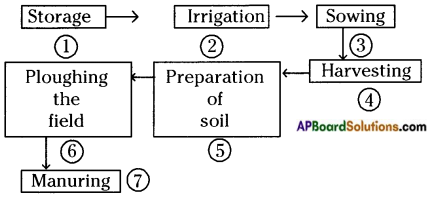
Answer:
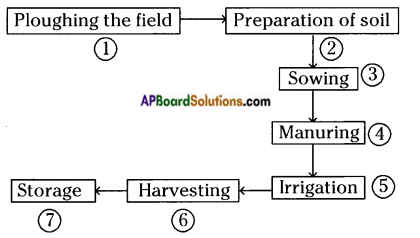
Question 3.
Give different methods of irrigating a crop in the field.
Answer:
- Lift irrigation
- Swinging basket
- Water wheel
- Tube well
- Sprinkler
- Drip irrigation
![]()
Question 4.
Draw and write the names of diseases that affect plants.
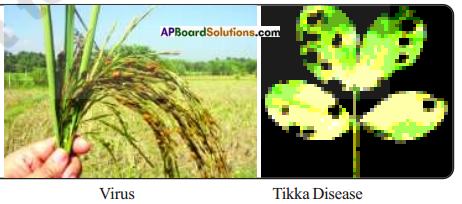
Answer:
- Virus in rice plant
- Tikka disease in groundnut
Question 5.
What are the advantages of ploughing in summer?
Answer:
- It improves the air circulation.
- Replacing the soil layers.
- Reduce the weeds and diseases.
- It improves the soil health.
- Roots are easy to penetrate in to the soil.
8th Class Biology 8th Lesson Production and Management of Food From Plants 4 Marks Important Questions and Answers
Question 1.
Collect the information from farmers about different crops and their sowing methods.
Answer:

![]()
Question 2.
Draw and label the diagram of sprouting paddy seeds.
Answer:
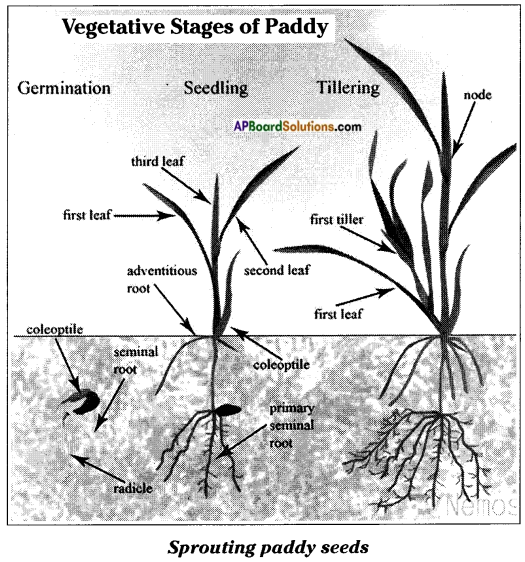
Question 3.
Take some paddy grains and soak them in water for one day. Take them into watch glass and sow them in soil. After that observe the radicle and plumule with the help of hand lens and draw the picture of it.
Answer:
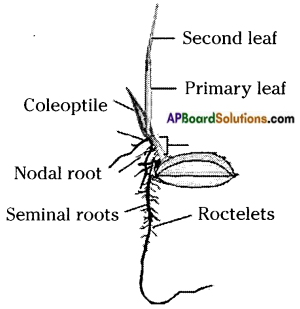
8th Class Biology 8th Lesson Production and Management of Food From Plants Important Questions and Answers
Question 1.
Give two examples of plants that grow with transplanting (Natlu veyadam).
Answer:
Paddy, wheat, chilli.
![]()
Question 2.
A farmer cultivated cotton crop in his field. He did not get sufficient yield. Guess any four causes for it.
Answer:
- The crops grown in the rainy season are termed as “Kharif”.
- Kharif season is from June to October.
- Examples for Kharif crops are paddy, sugarcane, jowar and turmeric, etc.
- The crops that are grown only in winter season are called Rabi crops.
- Rabi season is from October to March.
- Examples for Rabi crops are wheat, maize, coriandrum, fenugram, barli, etc.
Question 3.
Look at the picture and answer the following questions.
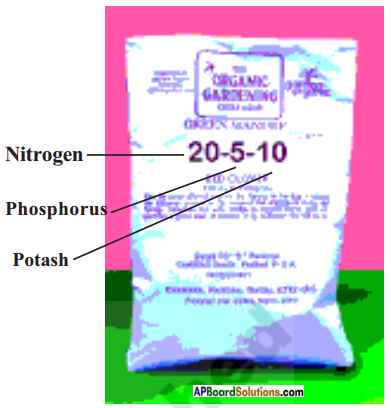
a) Which type of fertilizer is this?
b) What are the chemicals present in this?
c) What does 20-5-10 indicates?
d) Is it profit or loss by using this type of fertilizers? Why?
Answer:
a) Chemical fertilizer
b) Nitrogen (N), Phosphorus (P), Potash (K)
c) 20% of Nitrogen
5% of Phosphorus
10% of Potash
d) If we use chemical fertilizers for a longer period, soil health will be damaged. So, we should not use chemical fertilizers.
![]()
Question 4.
Study the following table and answer the questions.
| Name of the plant disease | Causative Microorganism | Mode of Transmission |
| Tobacco mosaic | Virus | Insects |
| Red rot of sugarcane | Fungi | Air, seedlings |
| Citrus canker | Bacteria | Air |
| Tikka disease of groundnut | Fungi | Air, seeds |
a) What are the diseases caused by fungi in plants?
b) What are the diseases Transmitted through air?
c) Which microorganisms cause Tikka disease of groundnut?
d) How virus transmit mosaic disease in tobacco?
Answer:
a) Red rot of sugarcane, Tikka disease of groundnut.
b) Red rot of sugarcane, citrus canker, Tikka disease of groundnut.
c) Fungus.
d) Through insects.
Question 5.
What is the similarity between sprinklers and drip irrigation?
Answer:
Sprinklers and drip – irrigation techniques are used in low water available soils. They are very useful for the farmers who are cultivating crops in dry lands. These are called as “micro – irrigation methods”.
